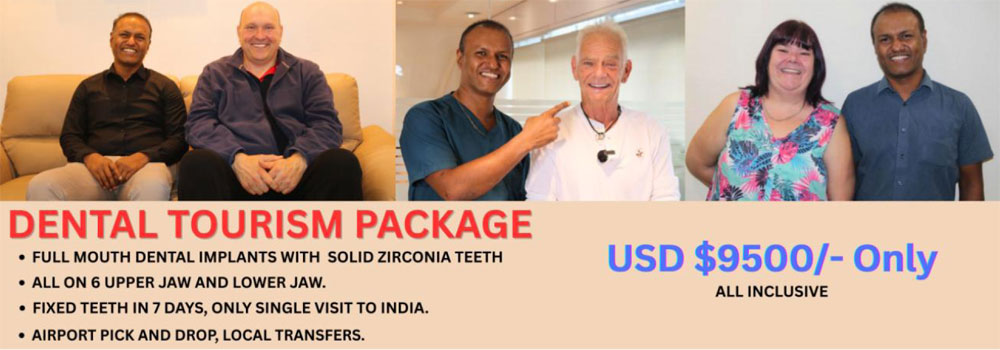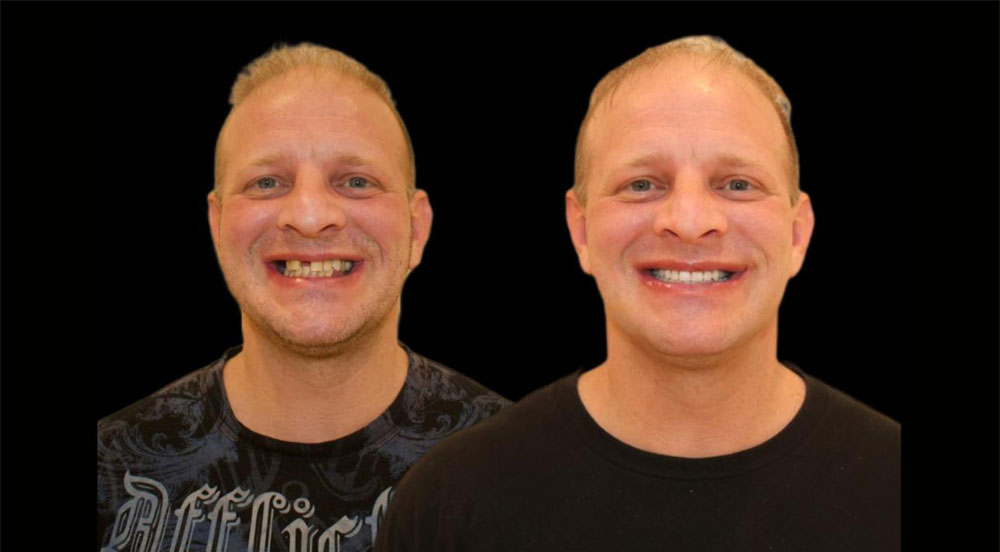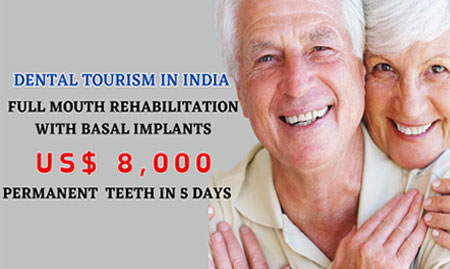
Dr. K Sharada Reddy, Author
Senior Dentist & Full Mouth Rehabilitation Expert
Dental implants in India have transformed restorative dentistry by providing a durable and effective solution for missing teeth. Among the various implant options, Mini dental implants (MDIs) have gained popularity due to their minimally invasive nature and cost-effectiveness. In this guide, we will explore mini dental implants, their advantages and disadvantages, and how they compare to All-on-4 dental implants in India and All-on-6 dental implants.
What Are Mini Dental Implants?
Mini dental implants are a smaller, less invasive alternative to traditional implants, measuring less than 3mm in diameter (compared to conventional implants, which range from 3.5mm to 6mm). MDIs are ideal for patients with insufficient bone volume, eliminating the need for extensive surgeries like sinus lifts and bone grafting.
These implants consist of a single-piece titanium screw with a ball-shaped head that protrudes above the gum line, making them suitable for:
- Supporting lower dentures
- Stabilizing loose prostheses
- Providing a long-term solution for limited bone structure
Advantages of Mini Dental Implants
Mini dental implants offer several benefits, making them appealing for specific patients:
- Minimally Invasive Procedure – Mini dental implants are placed through a small puncture in the gum tissue, reducing post-operative discomfort and healing time.
- Shorter Healing Time – Due to their less invasive nature, most patients experience minimal swelling and resume daily activities quickly.
- Immediate Loading – Mini dental implants allow for same-day denture stabilization, unlike traditional implants that require months of healing before prosthesis attachment.
- Cost-Effective – They are more affordable than conventional implants due to fewer surgical visits, no need for bone grafting, and smaller implant size.
- Suitable for Patients with Low Bone Density – Mini dental implants can be placed in areas with minimal bone structure, making them ideal for those who cannot undergo bone grafting.
- Less Discomfort and Faster Recovery – Since the procedure is less invasive, patients experience less pain, reducing the need for strong pain medications.
- Better Stability for Dentures – MDIs secure loose dentures, improving comfort, speech, and chewing ability.
Disadvantages of Mini Dental Implants
Despite their benefits, mini dental implants have some limitations:
- Limited Support for Full-Arch Restorations – Due to their smaller size and lower loadbearing capacity, Mini dental implants are not ideal for full-mouth rehabilitation.
- Not Suitable for High-Bite Force Areas – Mini dental implants are less durable than conventional implants, making them less ideal for patients with strong biting forces.
- Higher Risk of Fracture – Their small diameter makes Mini dental implants more prone to fracture or bending under excessive stress.
- Shorter Lifespan – While durable, MDIs generally have a shorter lifespan compared to traditional implants.
- Not Ideal for Single Tooth Replacement in Large Spaces – MDIs lack the stability needed for larger molars.

Mini Dental Implants vs. All-on-4 vs. All-on-6 Dental Implants
| Feature | Mini Dental Implants | All-on-4 Dental Implants | All-on-6 Dental Implants |
|---|---|---|---|
| Implant Size | < 3mm | 3.5mm – 6mm | 3.5mm – 6mm |
| Procedure | Minimally invasive | Moderately invasive | More invasive than All-on-4 |
| Healing Time | Short | 3-6 months | Similar to All-on-4 or longer |
| Bone Grafting | Rarely needed | Sometimes required | More likely than All-on-4 |
| Load Capacity | Lower | Moderate | High |
| Longevity | Shorter lifespan | Long-lasting | Longer lifespan |
| Cost | Most affordable | More expensive than MDIs | More expensive than All-on-4 |
| Denture Stability | Stabilizes dentures | Fixed prosthesis | Better stability than All-on-4 |
| Ideal for | Patients with minimal bone | Patients needing full-mouth restoration | Patients needing higher durability |
The CPBCCI Protocol: A Better Alternative to Mini Implants
While mini implants have several disadvantages in full-mouth rehabilitation, these limitations are addressed with the All-on-6 CPBCCI Protocol (Crestal Polished Bi-Cortical Conventional Implants).
Why Americans Should Choose All-on-6 with CPBCCI Over Mini Implants
- Less Invasive Yet More Stable
- Suitable for Cases of Severe Bone Loss Immediate Loading & Fixed Permanent Teeth in Less Than a Week
- Cost-Effective & Time-Efficient
- Durable & Long-Lasting Solution

Comparison Table: Mini Dental Implants vs. CPBCCI Protocol
| Feature | Mini Dental Implants (MDIs) | CPBCCI Protocol (by Dr. K A Reddy) |
|---|---|---|
| Bone Requirement | Requires some bone for placement | Suitable for absolute no bone cases |
| Type of Bone Engaged | Primarily soft bone (low stability) | Cortical bone, Pterygoid, and Zygomatic bone (high stability) |
| Suitability for Severe Bone Loss | Not recommended | Highly recommended |
| Prosthesis Type | Typically used for removable dentures | Fixed, Permanent Zirconia bridges on Titanium framework |
| Durability | Short lifespan, prone to failure | Long-lasting, highly stable |
| Time Required | Multiple visits over months | Permanent teeth in 7 days |
| Surgical Invasiveness | Minimally invasive but weak | Minimally invasive yet strong |
| Anesthesia | Local anesthesia | Local anesthesia |
| Cost | Expensive in the U.S. ($20,000 – $50,000) | 60-70% cheaper in India |
| Suitability for International Patients | Requires multiple trips | Single visit of 10-12 days |
| Overall Stability & Success Rate | Lower success rate, may require replacement of implants again | High success rate, permanent solution |
Frequently Asked Questions (FAQs)
Mini dental implants (MDIs) are narrow-diameter implants—typically less than 3mm—that are used to support dentures, crowns, or bridges, especially when bone volume is limited.
Size: Mini implants are smaller in diameter.
Procedure: Placement is less invasive and can often be completed in one visit.
Cost: Generally more affordable.
Strength: Not as strong or long-lasting as conventional implants.
Patients with insufficient bone for full-sized implants.
Elderly patients who need denture stabilization.
Individuals seeking a quicker, more affordable solution.
They can last for several years with proper care, but they are not as durable or long lasting as conventional implants.
Less invasive procedure.
Lower cost.
Quick recovery.
Immediate loading (in some cases).
Great for stabilizing lower dentures.
No. Due to their smaller size, they are less resistant to chewing forces, especially in the back of the mouth (molar areas).
No. They are not ideal for:
Replacing large molars.
Patients with heavy bite forces (bruxism).
Full-arch fixed restorations under high load.
Yes. Though less invasive, mini implants can still suffer bone loss over time, especially if overloaded or not maintained properly.
It can be more challenging, especially if the bone has already been compromised. In some cases, additional bone grafting may be required for future implant options.
Yes, they can be removed, but doing so might result in further bone loss or require additional surgical procedures if a conventional implant is to replaced.
Yes. They are generally 30–50% less expensive, but the total cost may vary based on the number of implants and the type of prosthesis.
On average, 5–10 years with proper care, though some may last longer depending on the case.
Brush and floss regularly.
Avoid hard or sticky foods if advised.
Visit your dentist every 6 months for follow-up and cleaning.
Mini implants are a great option in specific cases such as denture stabilization or when bone is limited and grafting is not an option. However, they are not a universal solution, and their limitations must be carefully evaluated by your Implantologist.
Mini implants are an excellent choice for specific dental conditions like to stabilize ill fitting dentures but are not suitable for everyone. A thorough evaluation by our implant specialist will help determine the best option for your needs.
For affordable teeth implants in India, schedule a consultation at LBR Dental & Implant Center today and Get a price estimate !




